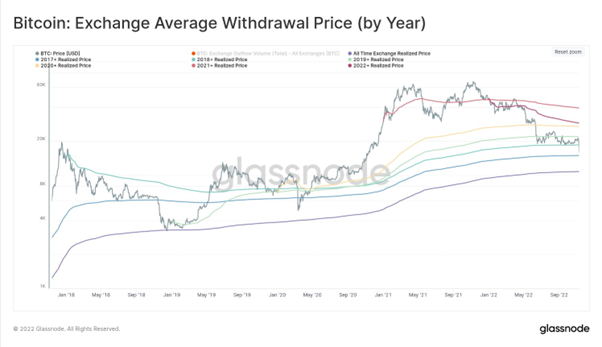Bitcoin Price: US$ 15,922.81 (-14.15%)
Ethereum Price: US$ 1,102.73 (-17.38%)
Solana TVL Drops Amid Growing Concerns on FTX/Binance Deal
- Binance is unlikely to complete its proposed takeover of FTX after reviewing the company’s books.
- CZ calls on all crypto exchanges to publish proof of reserves. Elsewhere, Binance tops up its insurance fund balance to $1B.
- Leaders of USDT and USDC claim they have no exposure to FTX or Alameda.
- Singapore’s state-owned investor, Temasek is engaging with FTX as its shareholder following the bailout plan from Binance.
- U.S. CTFC is monitoring Binance’s proposed acquisition of FTX.
- Over the last three days, the total value locked (TVL) across Solana is down by 45% from almost $1B to $554M. TVL in SOL tokens is down by 24% from 27M to 20M SOL, while SOL price itself is down by 45% during the same period.
- The big announcement that Binance is looking to acquire FTX has prompted growing concerns about the future of the blockchain.
- FTX and Alameda Research had become the biggest patrons of Solana by participating in funding rounds of many Solana-native protocols. If the deal with Binance goes through, new management is likely to favor its own BNB Chain.
- Alameda’s recently leaked balance sheet shows that the firm owns almost $1.1B of locked and unlocked SOL tokens. If the deal with Binance does not materialize, the firm may be forced to sell these holdings.
- Solana validators are also set to unlock more than 50M SOL tokens (13% of total supply) that are worth almost $1B in less than 24 hours. This can compound problems for the network as validators rush to sell tokens and exit the protocol.
- When people think of oracles, they think of Chainlink, and for good reason. A darling from the 2018-19 bear market, Chainlink is the most well-known and used oracle today, securing ~$12B across over 200 protocols, the majority of TVS (Total Value Secured) being Ethereum lending protocols Aave and Compound. These two lending protocols make up just over half of Chainlink’s TVS alone. Pyth is a new player who started last year with a focus on Solana and, more recently, is looking to branch out.
- Only a small group of users have access to timely and material market information. These are trading firms, market makers, and exchanges. Pyth has these participants publish prices directly to Pyth themselves, thereby removing the costs that come from data aggregation and significantly reducing the latency from off-chain price discovery to on-chain reporting, leading to more-timely and higher-quality prices. Many of Pyth’s publishers are well-known, from crypto entities like Amber and Wintermute to TradFi entities like Jane Street and the Cboe.
- Continue on Delphi…
DISRUPTORS: The Narrative Machine with Ben Hunt (YOUTUBE)
- Our sixth DISRUPTOR Ben Hunt is the Creator of Epsilon Theory, where he writes novel takes about markets using game theory and history. He’s also the Chief Investment Officer at Second Foundation Partners. He lives in Connecticut on a dilettante farm.
Ether officially turns deflationary amid intense crypto-market fear
- Ether, the native coin of the Ethereum network, officially turned deflationary 55 days after The Merge — its transition from proof-of-work to proof-of-stake.
- The post-Merge supply of ether has declined by over 400 ETH ($469,000), as of 5:35 a.m. ET, according to the Ethereum supply tracking website ultrasound.money. Ethereum’s deflation rate is currently 0.001% annually.
- Were the Merge never to have taken place and Ethereum remained proof-of-work, the total supply of ether would have increased by over 650,000 ETH ($762 million) with an inflation rate of nearly 3.6%.
Vitalik Buterin’s New Ethereum Road Map Takes Aim at MEV and Censorship
- Ethereum was founded on a vague, albeit tightly held set of principles around financial freedom and credible neutrality. Recently, those principles have been tested.
- As regulators and big-money players bid for a larger role in Ethereum’s “decentralized” ecosystem, the blockchain’s co-founder, Vitalik Buterin, shared an updated vision for the network on Saturday – augmenting a road map he shared last month to include a new development track focused on ameliorating the censorship of transactions and an exploitative bot-driven trading practice known as maximal extractable value (MEV).
- Censorship and MEV have become more existential for Ethereum in recent months, with governments and sophisticated users challenging key safeguards meant to ensure the network’s neutrality – the idea that anyone using or building on the network is treated without bias.
Inflation Expected to Tick Down in Latest CPI Report
- While most of the country was waiting on U.S. midterm election results on Tuesday, observers of the economy were already looking toward Thursday’s fresh inflation report.
- According to analysts reporting to FactSet, the U.S. Labor Department’s Consumer Price Index (CPI) rose an estimated 8% on a year-over-year basis in October, down from the 8.2% reported in September. Core CPI, which excludes food and energy prices, is forecast to be 0.5% against 0.6% last month.
- The declines come as the U.S. central bank continues its months-long quest of taming inflation without casting the economy into a steep recession. Recent economic indicators have offered faint hope that the Fed could still scale back its recent monetary hawkishness.
- Thursday’s data will be the first of two inflation reports before the Federal Open Market Committee (FOMC) meets for the final time this year on Dec. 14-15.
- “That means the market impact may be more muted unless there is major divergence from the estimates,” said Jamie Dutta, market analyst at Vantage.
Twitter Registers as Payments Biz as Post-Musk Dogecoin Gains Are Erased
- The Musk Twitter era is off to a rocky start, with several high-profile users vowing to leave the site after the controversial billionaire bought it. So far undeterred, the new leadership at Twitter has taken its first steps toward becoming a payment processor.
- In a filing with the U.S. Treasury Department Financial Crimes Enforcement Network or FinCEN, Twitter has applied to become a money service business.
- Twitter Payments LLC registered and filed its application as a money transmitter on November 4, 2022. The application says Twitter plans to conduct money services in the United States and several of its international territories.
Tron Network USDD Stablecoin Wobbles from Dollar Peg Amid Latest Crypto Crisis
- The Tron network’s algorithmic stablecoin Decentralized USD (USDD), championed by Tron-founder Justin Sun, dropped from its $1 anchor as the implosion of the prominent crypto exchange FTX shook investors’ confidence in broader crypto markets.
- USDD fell to as low as below 97 cents on multiple crypto exchanges Wednesday, after it deviated from a supposed 1:1 exchange rate with the U.S. dollar a day before.
- The USDD liquidity pool on the decentralized finance protocol Curve, where users can trade USDD for other stablecoins such as USDT, USDC and DAI, is heavily imbalanced, with USDD accounting for almost 80% of assets in the pool. This imbalance suggests that more investors want to sell USDD than buy, putting downward pressure on USDD’s price. The USDD exchange rate for other stablecoins was most recently around 98.5 cents.
- Sun speculated in a tweet that Alameda Research, the liquidity-strapped trading firm and sister company of struggling crypto exchange FTX, might have sold its USDD holdings, kickstarting the stablecoin’s deviation from the peg.
A Failed FTX-Binance Deal Is ‘Catastrophic’ for Crypto Sector
- Betting on Sam Bankman-Fried (SBF), the once-beloved posterboy and “white knight” of crypto was supposed to be safe. But recent events have shown that’s far from the truth.
- Following on the heels of the Terra ecosystem collapse, the Celsius insolvency and the Three Arrows Capital blow up, the crypto industry fell into even greater turmoil this week after SBF’s crypto exchange FTX was forced to seek a bailout amid liquidity issues. While a non-binding deal with competitor Binance stemmed the panic for a short time Tuesday, things took an even darker turn after CoinDesk Wednesday morning reported that Binance was highly unlikely to go through with its proposed acquisition. By late Wednesday afternoon, Binance itself confirmed that the deal is off, sending crypto markets plunging even further, with bitcoin (BTC) sinking below $16,000 for the first time in two years.
- Unless another buyer is waiting in the wings, Binance’s exit from the acquisition likely seals the fate for FTX, and with that, trust in the crypto industry will further decline from both retail and institutional investors.
- “A lot of normal users will lose their money, so this will be catastrophic for the ecosystem in the short-term,” said Jay Jog, co-founder of Layer 1 blockchain Sei Network. “There will be degraded confidence in crypto in the short term, both from an institutional standpoint and from a retail standpoint,” he added.
FTX and Alameda Contagion Fears Tank NFT Markets
- Rumors of Alameda liquidating its Solana holdings are sending SOL’s price into free fall; both Solana and Ethereum-based NFT markets are getting hit hard by the news.
- According to data from Dune Analytics, OpenSea’s daily NFT trading volume on Solana has fallen from about 4,900 SOL, or $70,000, to just shy of 1,000 SOL, or $14,000 since Tuesday. For Solana-based leading NFT marketplace Magic Eden, trading volume of SOL has fallen from about 153,000 SOL or $2.5 million to almost 84,000 SOL, or about $1.4 million.
- Additional data from Dune showcases OpenSea’s daily trading volume on Ethereum has also fallen from about 6,000 ETH, or $7.1 million, to about 3,900 ETH or $4.6 million in the past day.
- According to a Tweet posted Wednesday by Twitter user @Punk9059, director of research at NFT collective PROOF, OpenSea is experiencing its all-time high ratio of wrapped ETH to ETH volume, meaning that NFT buyers are purchasing NFTs at bid prices, rather than buyers purchasing assets at seller’s offer prices, suggesting that users are trying to liquidate as soon as possible.
Solana Blockchain Hit by FTX Tremors as Nearly $800M SOL Tokens Set to Be Unstaked
- The epic comedown of Sam Bankman-Fried’s FTX crypto exchange and Alameda Research trading firm are making waves in the market for the Solana blockchain’s SOL token – to the point where some investors have apparently become so nervous that they’re demanding back tokens they had “staked” or deposited into the blockchain’s underlying security protocol.
- Earlier this week, when concerns started to grow over the state of the two businesses’ finances, crypto market analysts began to speculate that Alameda might need to sell some of its SOL tokens to raise liquidity. The fears sent the SOL price tumbling – as traders rushed to get ahead of the selling pressure.
- Now, apparently, the dynamic has risen to another level: Solana validators who provide security to the blockchain are set to unlock nearly $800 million worth of their SOL holdings as the end of the token lock-in period known as “Epoch 370” approaches – in fewer than 13 hours.
Crypto.com Halts Solana USDC and USDT Deposits, Withdrawals
- Cryptocurrency exchange platform Crypto.com has halted the flow of two top Solana ecosystem stablecoins, as the implosion of Sam Bankman-Fried’s FTX empire continues to wreak havoc across the wider crypto ecosystem.
- Citing “recent industry events” in an email to users Wednesday, Crypto.com said “effective immediately” the platform would be “suspending deposits and withdrawals of USDC and USDT on the Solana Blockchain in the Crypto.com App and Exchange.”
- The email continued to say that stablecoin deposits in other ecosystems, including Ethereum and Cronos, would not be impacted.
- Crypto.com CEO Kris Marszalek, in a tweet responding to this article, explained that “FTX was an important bridge/venue for SOL-based stablecoins, we do not want any additional risk to our users coming from this area, hence disabling it.”
Multicoin Capital hit by FTX collapse, with 10% of its fund’s AUM stuck on the exchange
- Multicoin Capital, one of the top crypto-focused venture capital firms, is significantly impacted by crypto exchange FTX’s collapse, a letter obtained by The Block shows.
- The letter, sent Tuesday by Multicoin Capital managing partners Kyle Samani and Tushar Jain to partners of the firm’s “Master Fund,” shows that around 10% of the fund’s total assets under management (AUM) are still pending withdrawals on FTX.
- “Unfortunately, we were not able to withdraw all of the Fund’s assets on FTX,” the letter reads. “Assets including BTC, ETH, and USD are pending withdrawal and represent approximately 15.6% of the assets in the Fund (excluding side pockets) and approximately 9.7% of total Fund AUM.”
- Before FTX halted withdrawals on Tuesday, Multicoin Capital was able to withdraw around 24% of the fund’s assets that were held on the exchange, according to the letter. The letter does not mention dollar figures corresponding to the percentages. Multicoin Capital did not respond to The Block’s request for comment by press time.
Galaxy Digital reveals $77 million exposure to FTX in Q3 earnings
- Galaxy Digital has a $76.8 million exposure to FTX, of which $47.5 million is currently “in the withdrawal process,” the company said in its third quarter earnings report.
- In addition, co-President, Damien Vanderwilt will step down in mid-January and take a seat on the board.
- The company reported a net loss of $68 million in the third quarter, and assets under management of nearly $2 billion, up 17% from the previous period.
- The company’s losses were driven by “reduced valuations on certain investments due to external market conditions,” and the increased operating expense for its mining business due to impairments in mining assets. The company retained $1.5 billion in liquidity and $1 billion in cash.
DeFi Exchange Platform dYdX Places Solana in ‘Close Only’ Mode
- Decentralized exchange dYdX placed Solana trades in “close only” mode, meaning users will only be able to close out their positions on the perpetuals exchange and not open new ones.
- dYdX cited “market volatility” as its reason for making the move. Solana’s SOL token fell precipitously today on the news that FTX, a crypto exchange that holds a major stake in Solana, has become insolvent. SOL is currently priced at $14.10, down 40% from $24 a day ago.
Hostaged FTX Funds Sold for Pennies on the Dollar in OTC Trades Among Customers
Alameda, In Eye of Crypto Storm, Takes $37M of Wrapped Bitcoin Off FTX.US Exchange
FTX Faces US Justice Department Probe: Report
Glassnode
- With #Bitcoin prices trading at $15.7k, only investors from the class of 2017 and earlier are now in profit.
- Using the average exchange withdrawal price since 1-Jan each year, we can see that the class of 2018 support at $18.5k has been lost

- Glassnode: Our latest video report covering the Fall of the #FTX Empire is live. (YOUTUBE)
- We cover:
- Relationship between FTX, Alameda and Binance.
- Token composition of multi-billion USD transfers.
- The collapse of FTX during the bank run.
- Reaction of #Bitcoin holders



